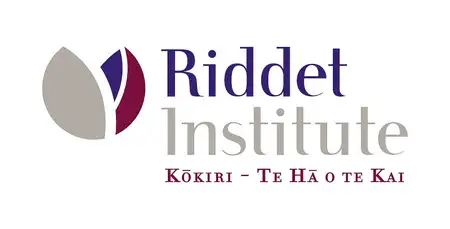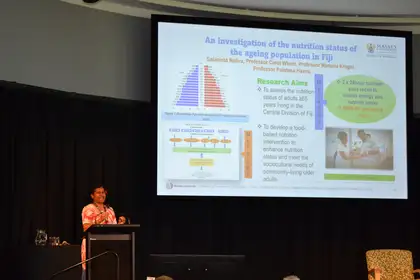
Salanieta Naliva taking part in a three-minute research presentation competition in November 2022.
Salanieta Naliva, who goes by the name Sala, grew up in Fiji and attended the University of the South Pacific, graduating with a Bachelor of Education and Bachelor of Science. Following her studies, she taught for a few months in a rural school and then found a vacancy at the then Fiji School of Medicine as a nutrition and dietetics lecturer. She went on to complete a Master of Public Health at Fiji National University.
During the lockdowns of 2021, Sala says she began searching the internet for universities in New Zealand that she might be able to pursue her PhD at.
“I’d heard of Massey from colleagues in Fiji who have studied and are currently studying at Massey, so began my search on the university’s web page. I emailed the Head of School of Sport, Exercise and Nutrition, Associate Professor Andrew Foskett, to enquire about the possibility of connecting me to an academic advisor in nutrition for older adults, my area of interest.”
Dr Foskett connected Sala with Professor Carol Wham, Professor Marlena Kruger and Professor Tasa Havea, who became her PhD supervisory team. The latter two are also Associate Investigators with the Riddet Institute, a Centre of Research Excellence (CoRE) hosted by Massey which focuses on fundamental and advanced food research.
“Being provided with the right information and directed to the right people within the university who would help my PhD journey was very important at the early stage and I felt Massey had the right environment and resources to support students right from the beginning,” Sala says.
She says it was a tough but worthwhile journey to get everything in order to be able to make the move to New Zealand to pursue her studies.
“I had to put my application in, wait for a scholarship outcome, work on my visa during the border closure, organise my release for study leave from my institution in Fiji and organise my family needs as I was the sole income earner for my family.”
Sala is a married mother of five children, ranging in age from nine to 15. When she returned to work post maternity leave, her husband raised the children.
“I had to sacrifice leaving my family in Fiji, but I know others have walked this journey before me and they came through, so that motivates me to keep going and do what I am passionate about because it will be worth it one day.
“As a full-time student away from my family, a mother and wife, I believe it is important that we look after each other, encourage one another and have a common family goal in this journey. They keep me going every day. My Christian faith keeps me grounded and I appreciate how God has been with me and my family and helped me get through each day.”
Sala’s PhD research is looking at what adults aged 55-years and above in Fiji are eating, the social and health factors that put them at nutrition risk, and interventions that would work in the Fijian context.
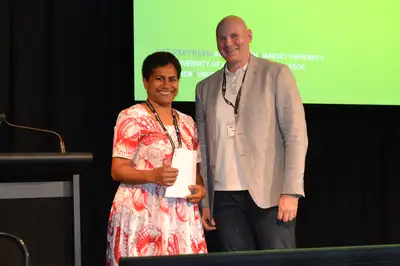
Salanieta Naliva receiving her prize for winning the three-minute research presentation competition from Riddet Institute board member and acting chair Mark Piper.
She’s currently nine months into her study journey and says she chose the topic of her research due to concerns related to the population of the Asia-Pacific region ageing more rapidly than any other region, especially in Fiji.
“This concerns me because there will be a time when there will be more older adults than younger people and this will have an impact on our health system. Evidence has shown that nutrition plays an integral part in living better and longer in older adults. Parallel to the increase in ageing population is the ongoing “crisis” of non-communicable diseases and premature deaths before 60 years of age, and these challenges put an extra burden on our health system. Older adults are also often left out in health research in Fiji, thus my passion is to investigate why and how nutrition can play a key role in the nutritional status of the younger-older age to the oldest-old adults in Fiji.”
Sala says she hopes her research findings will make a real difference.
“I am optimistic that my study will help with baseline information on what older people in Fiji are consuming, what dietary changes can be made to meet nutritional requirements, what factors affect their nutrition status, possible interventions that are sustainable, culturally relevant and cost effective, be able to train and educate other health professionals on protocols and guidelines for nutritional needs assessment and make effective policy-making decisions in addressing nutrition and wellbeing in our older people in Fiji.”
She says she is thankful to Professor Tasa Havea who played an important role in helping her secure the first Pacific Riddet Institute PhD scholarship.
“To come from the Pacific Islands where obtaining a PhD qualification is rare and where resources are limited, to securing a prestigious scholarship from a renowned global food science and nutrition research institute is a great leap of faith and opportunities.
“I am very grateful to the Riddet Institute for the scholarship opportunity to help my people back home, to help my young family secure a better livelihood for their future and for my professional network and growth.”
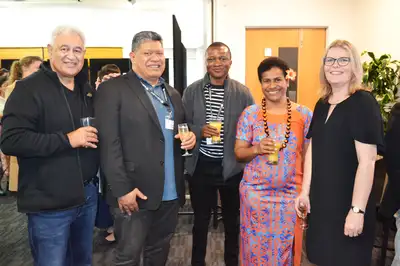
From left: Tana Te Hiwi, Professor Tasa Havea, Ejovi Abafe, Salanieta Naliva and Terri Palmer at the Riddet Institute Conference and Student Colloquium in Napier in November 2022.
Professor Havea says the scholarship ties in with the university’s work to promote science education among Pacific students.
“Part of the university’s strategy, in particular the Pacific Strategic Plan Weaving Wisdom into a Resilient Future, is to produce more Pacific scientists, which is in line with the country’s work to promote science education among Pacific students. The Pacific Student Success team has worked with Riddet to offer these types of opportunities for our Pacific students.”
Riddet Institute Director Distinguished Professor Harjinder Singh says the Institute is excited to be supporting Sala’s studies with a Riddet Institute Scholarship.
“Sala’s research will make a real difference in Pacific communities, and we are so pleased to be able to play a part in the impact she will make in the world.”
Related news
Pacific values redefine work-integrated learning frameworks
It is common for higher education institutions to possess Pacific-focused learner success plans. Such plans emphasise the importance of educators understanding the needs and preferences of Pacific students.

Fuimaono Karl Pulotu-Endemann the first Pacific person to receive an Honorary Doctorate from Massey University
Fuimaono Karl Pulotu-Endemann has been presented with an Honorary Doctorate in Health (honoris causa) in recognition of his outstanding service and contribution to the health of Pacific people.
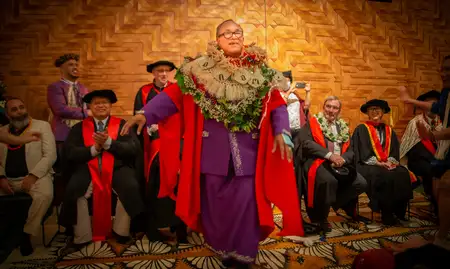
Continued CoRE funding for the Riddet Institute
The Tertiary Education Commission has awarded the Institute $38.25 million for the next seven and a half years.
